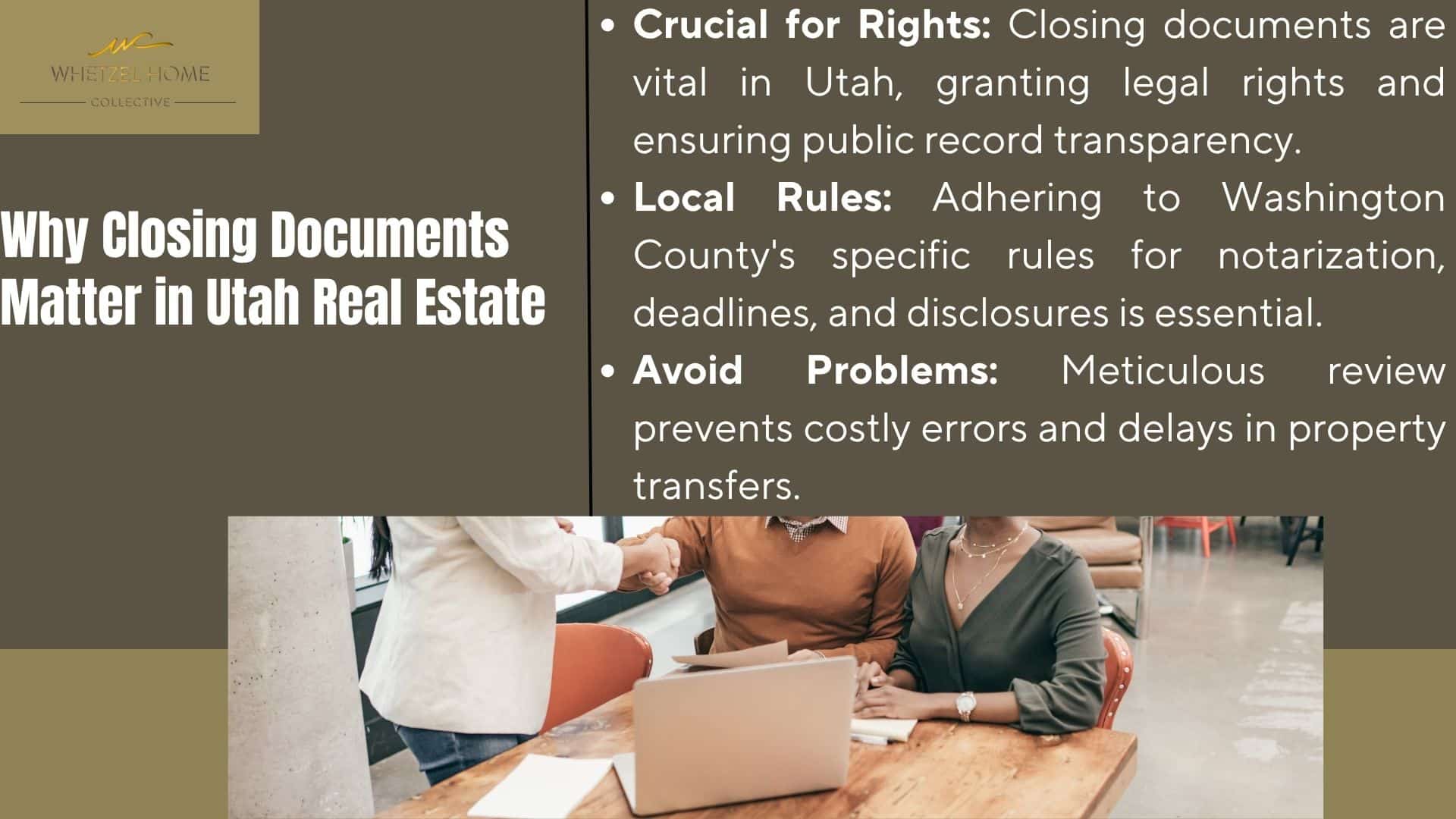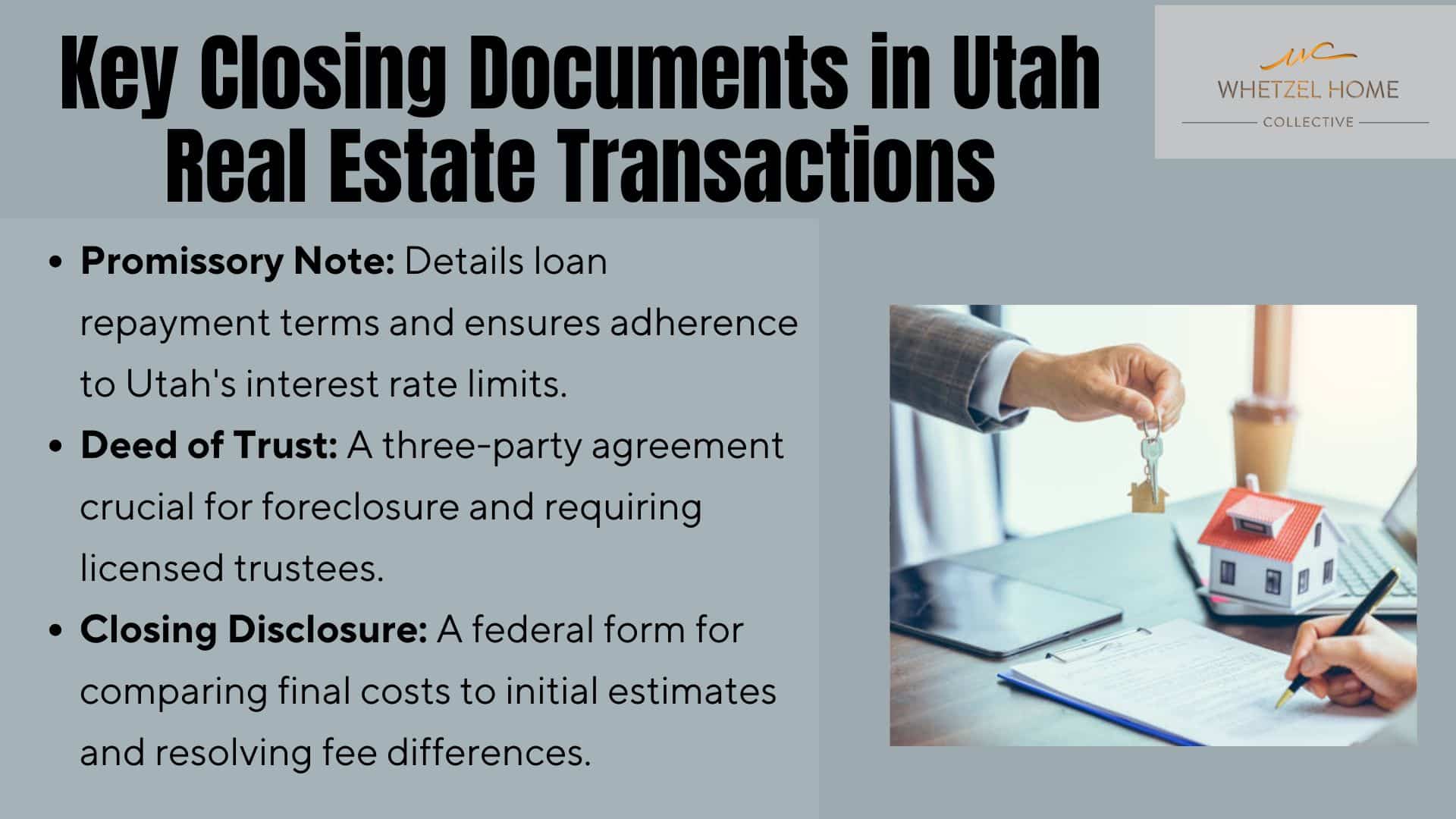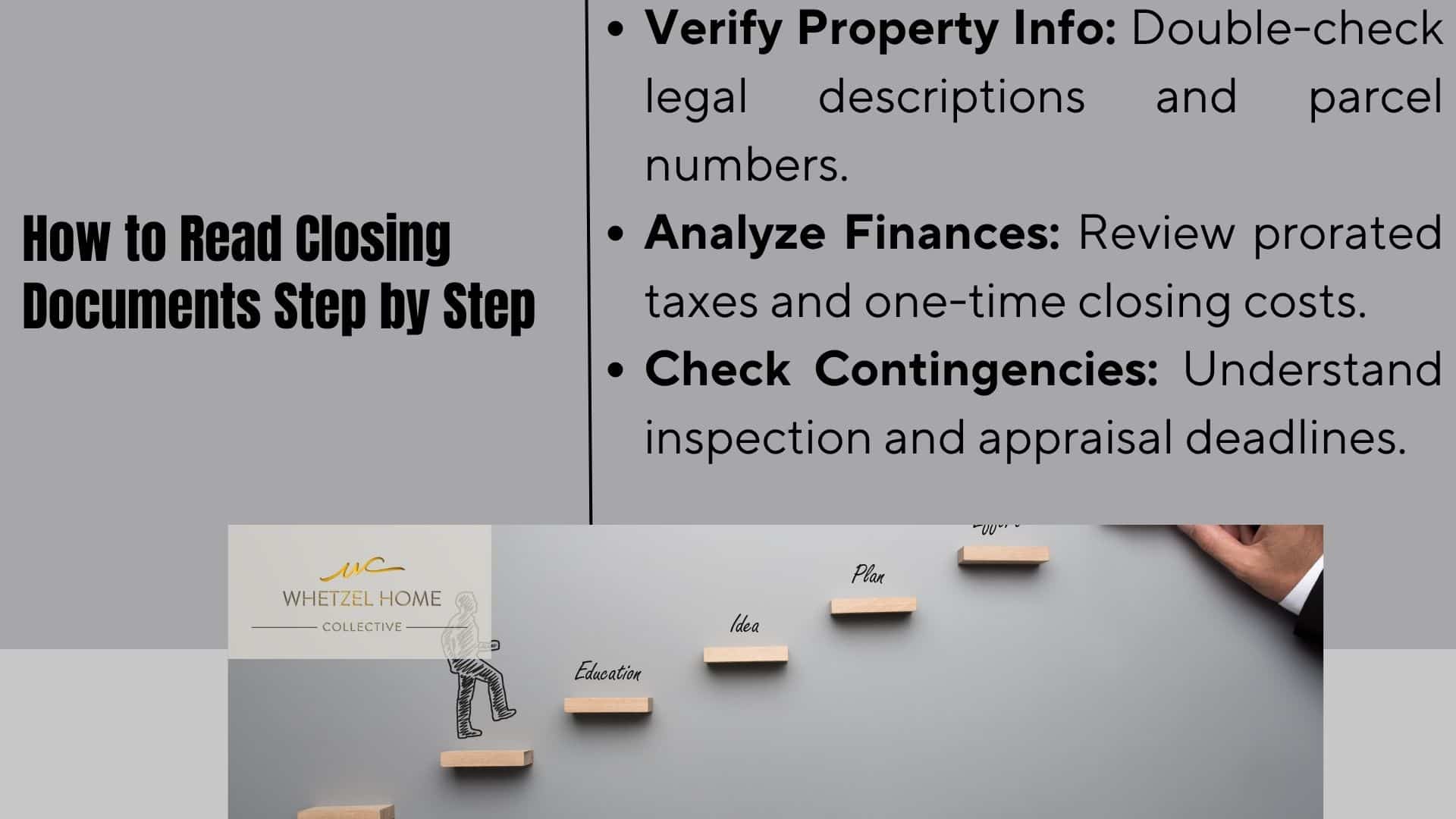
Did you know 23% of Utah real estate deals get delayed because of paperwork mistakes? A study by the Utah Association of Realtors found this surprising gap in homeowners’ knowledge of legal agreements. At Whetzel Homes Collective, we’ve seen how overwhelming the final steps can be, even in St. George’s fast market.
Utah’s property laws have special clauses that even experienced buyers might overlook. From escrow instructions to title insurance, every detail is important. We help homeowners understand complex terms and spot important dates, making sure nothing is missed during this critical time.
Our team is great at making complex rules easy to follow. Whether it’s checking settlement statements or loan terms, we focus on being clear. Signing papers shouldn’t be like trying to read ancient texts.
Key Takeaways
- Closing documents dictate financial obligations and property rights
- Utah-specific clauses often require local expertise to interpret
- Missing deadlines or signatures can delay ownership transfers
- Professional review prevents costly oversights in final agreements
- Whetzel Homes Collective simplifies technical jargon for clients
Why Closing Documents Matter in Utah Real Estate

Utah law makes standard paperwork very important for both buyers and sellers. These agreements do more than just end transactions. They also give real rights under laws like Government Code 54957.5(b). This law makes sure all records are open to the public, making it key to handle documents right for property transfers.
In St. George, Washington County’s rules add more detail. Our team often deals with three main things:
- Notarization standards for deeds and affidavits
- Deadlines for submitting settlement statements
- Proper disclosure of easements or liens
Understanding mortgage documents is very important. A small mistake in reading real estate contracts can cause big problems later. We’ve seen cases where sellers had to redo everything because of missing details. This shows how important it is to check everything carefully.
Local rules in southern Utah need extra attention. St. George’s recorder won’t accept documents without the right legal details or parcel numbers. We check these against county maps and tax records before we send them in.
At Whetzel Homes Collective, we make sure there are no delays. We check every signature, notary seal, and disclosure page carefully. This ensures your documents meet Utah’s laws and Washington County’s specific rules.
Key Closing Documents in Utah Real Estate Transactions

Understanding Utah’s closing paperwork is key. It involves three critical documents that protect buyers and lenders. At Whetzel Homes Collective, we make sure you know how each document affects your deal. Let’s look at the legal papers that seal property deals in Southern Utah.
Promissory Note Essentials
This contract outlines your mortgage repayment terms. We go over each clause with clients to avoid any confusion.
Loan Repayment Obligations Explained
Your note details payment amounts, due dates, and late payment penalties. Utah law requires clear disclosure of prepayment penalties. We helped a St. George client renegotiate terms that had high fees.
Utah-Specific Interest Rate Disclosures
State laws cap interest rates at 10% for residential loans. Our team checks this against lender documents. We caught a 10.5% rate error in a Hurricane, UT deal last quarter.
Deed of Trust Components
Utah uses deeds of trust with three active parties. This setup speeds up foreclosure if defaults happen.
Three-Party Agreement Structure
The document binds:
- Borrower (property buyer)
- Lender (mortgage provider)
- Trustee (neutral third party)
We make sure trustees meet Utah’s licensing rules. This avoids title defects seen in 14% of Washington County homes last year.
Closing Disclosure Breakdown
Federal law requires lenders to give this form three days before settlement. We compare it with your initial loan estimate.
Comparing Loan Estimates to Final Costs
Common variances we resolve:
- Title insurance premiums
- Escrow deposits
- Recording fees
Last year, 62% of our clients saved money through these comparisons.
Washington County Fee Verification
Local transfer taxes and recording costs vary across Utah. We check fees with the county’s 2024 schedule. Recently, we saved a buyer $387 in overestimated document fees.
How to Read Closing Documents Step by Step

Understanding closing paperwork is key, more so in Utah’s fast-paced real estate scene. At Whetzel Homes Collective, we’ve crafted a three-step review process. It ensures buyers check every detail with confidence. Our checklist is based on hundreds of transactions in Washington County.
1. Verify Property Information Accuracy
First, make sure all property details match what you expect. In St. George, we often find errors in:
Cross-checking legal descriptions
Match the legal description with your property survey. Look for exact matches in boundary markers and easement notes. This is vital in desert landscaping areas.
Confirming Washington County parcel numbers
Ensure the 10-digit tax ID matches the county assessor’s website. Last year, 12% of our files had wrong parcel numbers, affecting title transfers.
2. Analyze Financial Obligations
Utah’s closing costs can surprise buyers. Our team focuses on two main areas:
Understanding prorated taxes
Check the partial-year property tax calculations. We found a $1,842 error in a Bloomington Hills closing due to outdated rates.
Identifying non-recurring closing costs
Look for one-time fees like transfer taxes ($325 statewide) and recording fees ($65 per document). These shouldn’t appear on future bills.
3. Review Contingency Clauses
Utah’s contract timelines are strict. Be careful with:
Utah-specific inspection requirements
Most contracts allow 10 days for inspections. We suggest radon testing before day 7 due to our granite bedrock.
Appraisal contingency deadlines
Be aware of the 17-day appraisal clock. If your St. George home appraises low, renegotiate or cancel by 5pm MT on day 17. We remind clients 3 days before the deadline.
Our team checks all documents against current zoning maps and Utah’s Real Estate Purchase Contract (REPC). Last quarter, 23% of our deals needed HOA disclosure corrections. These were mostly about RV parking and xeriscaping rules specific to our area.
Utah-Specific Considerations for Closing Paperwork
Utah’s real estate has its own set of rules for closing documents. These include statewide disclosures and local St. George rules. We help clients understand these rules to avoid delays.
State Mandated Disclosures
Utah Real Estate Purchase Contract (REPC)
The REPC is key in Utah deals, but its “as-is” clauses can surprise buyers. These clauses mean buyers take on property defects unless agreed upon. We check every detail to spot hidden risks.
Lead-Based Paint Requirements for Older Homes
Older homes in Utah need special disclosures. Sellers must give lead hazard records and allow a 10-day inspection. We guide clients through this process for homes built before 1978.
Local St. George Requirements
Water Rights Documentation
In St. George, water rights are very important. Closing documents include irrigation shares and well permits. Without these, landscaping plans could fail or lead to fines.
Desert Landscaping Covenants
St. George HOAs have rules for drought-resistant plants. We check closing documents against these rules to avoid problems. Our team looks for clauses about grass and plants.
Understanding Utah’s closing paperwork needs local knowledge. For help with legal terms, call us at (435) 334-1544. We make complex terms clear and ensure all rules are followed.
Common Mistakes When Reviewing Closing Documents
Utah property buyers often make three big mistakes when checking final paperwork. These errors can cause delays, extra costs, or legal problems. We’ve found common issues in Utah court records and our own work that buyers should know.
Overlooking Notary Requirements
Utah law is clear about notarization for real estate contracts. A 2021 case in St. George shows how important it is. A $480,000 sale fell through because the seller used an expired notary stamp. Here’s what to look for:
- Commission expiration dates
- Complete witness signatures
- Proper jurisdictional wording
Many think MERS-registered loans mean no title checks are needed. But, a client’s title report showed a 1998 lien we had to fix.
Misunderstanding Escrow Instructions
Escrow accounts have strict rules that vary by county in Utah. We make sure to avoid mistakes by:
- Double-checking payment deadlines
- Checking tax proration calculations
- Confirming insurance premium allocations
One buyer almost lost $12,000 because of a mistake in Washington County. They thought “funds due within 24 hours” meant “72 hours.” We caught this error during our final review.
Ignoring Title Insurance Details
Title policies have important exceptions that affect property rights. A 2022 Utah Court of Appeals case shows how big these issues can be. Always check:
- Policy type (owner’s vs. lender’s)
- Survey coverage inclusions
- Mechanic’s lien protections
We saved a Cedar City family from financial disaster. We found mineral rights that could have led to drilling operations.
How We Simplify Document Review at Whetzel Homes Collective
Dealing with closing documents doesn’t have to be hard. At Whetzel Homes Collective, we make it easy with our tools and local knowledge. We focus on clear, simple steps to protect your interests in Utah real estate.
- Automated Cross-Referencing: We quickly check property details against Washington County’s database. This helps spot any errors in lot sizes, zoning, or ownership.
- Notary Network Coordination: We work with St. George notaries to ensure your documents are properly witnessed. This saves you from last-minute rushes.
- Line-Item Error Checking: Our software checks for any number mistakes in your closing disclosure, loan estimates, and purchase contract.
Every client gets a color-coded summary sheet. It shows important dates, financial details, and deadlines. This makes it easier to understand and make decisions.
Want stress-free document review? Call our St. George office at (435) 334-1544 to set up a document audit. Let us take care of the details so you can move forward.
Conclusion
Understanding closing documents is key in Utah’s fast-changing housing market. Whetzel Homes Collective has 20 years of experience in St. George and Washington County. Our team makes complex paperwork easy to understand, always looking out for our clients.
Utah real estate laws are strict, with rules for disclosures and local needs. We check the fine print on promissory notes, title insurance, and escrow details. This helps avoid expensive mistakes. Our clear explanations help clients understand their financial commitments and any conditions.
Issues like notary mistakes or unclear deed of trust details are no problem for us. We compare closing disclosures with loan estimates and property records. This careful work has made us the top choice for document services in southern Utah.
Want to make your next property deal easier? Whetzel Homes Collective makes closings simple. Reach out to our St. George office for help with Utah’s real estate documents. Let our knowledge help you invest in property with confidence.
